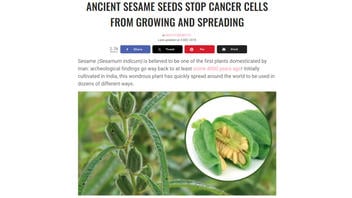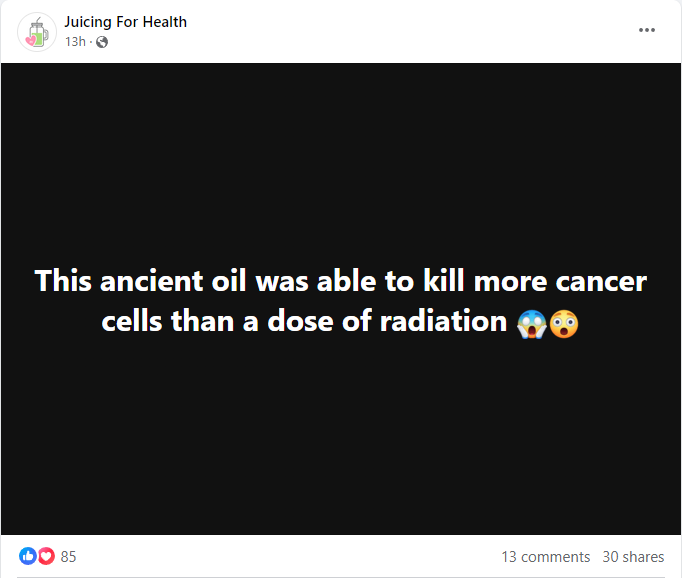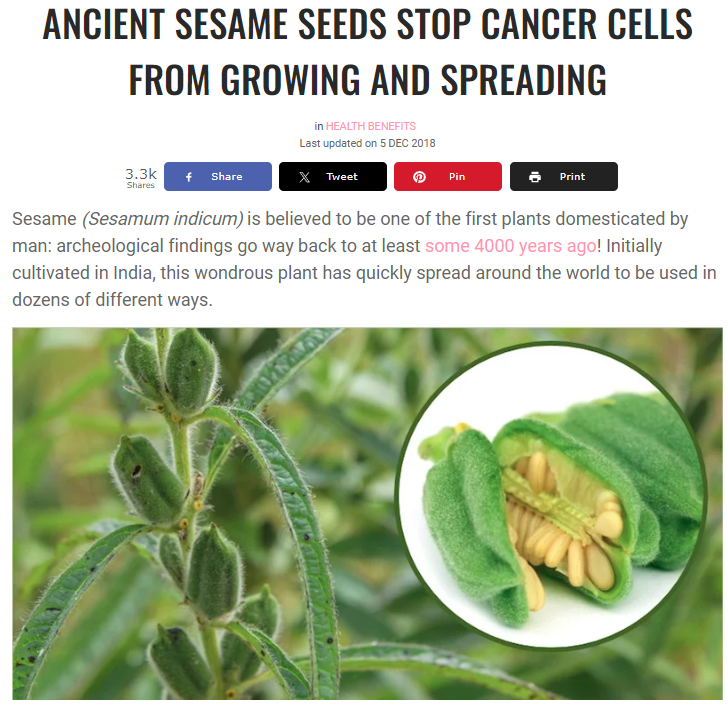STORY UPDATED: check for updates below.

Is sesame oil a more effective cancer treatment than a dose of radiation or chemotherapy? No, that's not true: Sesame oil is not a recognized or proven treatment for cancer. In contrast, radiation and chemotherapy are widely accepted medical treatments that have been extensively studied and shown to be effective in many cases by targeting and killing cancer cells or inhibiting their growth.
The claim appeared in a post (archived here) on Facebook by Juicing For Health on April 1, 2024. The post's on-screen caption said:
This ancient oil was able to kill more cancer cells than a dose of radiation 😱😲
This is what the post looked like on Facebook at the time of writing:
(Source: Facebook screenshot taken on Tue Apr 2 15:12:04 2024 UTC)
In the post's comments section, the author published a link (archived here) to an article on the Juicing For Health (JFH) website titled "ANCIENT SESAME SEEDS STOP CANCER CELLS FROM GROWING AND SPREADING."
This is what the article looked like on the Juicing For Health website at the time of writing:
(Source: Juicing For Health screenshot taken on Tue Apr 2 17:03:13 2024 UTC)
The article
Neither the JFH social media post nor its article support the claims that sesame seeds or their oil "kill more cancer cells than a dose of radiation" or "stop cancer cells from growing or spreading." The JFH story cites two papers (here and here) endorsing the potential medical benefits of the properties found in sesame seeds. Still, neither suggest they are more effective than radiation or chemotherapy. This overstates their conclusions.
The research shows that sesamin, a compound found in sesame seeds, might help fight cancer by reducing inflammation and preventing cancer cells from proliferating and metastasizing. One of the papers said more studies with animals and humans are needed to confirm these effects.
Overall, the papers suggest that sesamin could potentially be a useful addition to cancer treatment by slowing down tumor growth and potentially preventing cancer from developing in the first place.
Oncology nutrition therapist
Rebecca Beaudoin, a registered dietitian nutritionist and an outpatient oncology nutrition therapist at Nebraska Medicine in Omaha, said sesame oil is not a more effective cancer treatment than radiation or chemotherapy. In an April 3, 2024, email to Lead Stories, she said:
There are no studies to my knowledge testing the efficacy of sesame oil as an actual TREATMENT for cancer, whereas we have years of data with the efficacy of radiation or chemo. A healthier diet, including moderation with seed oils, can help your tolerance and quality of life during cancer treatment.
In an email a day earlier, she stated, "There is research that seed oils, including sesame, when replacing saturated fats, have a beneficial effect on our health." Beaudoin continued:
No one food is responsible for decreasing cancer risk. An overall healthy pattern of eating can decrease our risk for cancer. Sesame seed oil should be used in moderation, as it is very calorically dense and an excess of calories negatively impacts our weight. A healthy body weight is part of what lowers our cancer risk.
National Cancer Institute
In an April 3, 2024, email to Lead Stories, the National Cancer Institute at the National Institutes of Health provided a response to the social media claims that "sesame oil is more effective than a dose of radiation chemotherapy" and "sesame seeds stop cancer cells from growing and spreading." This is what it said:
The National Cancer Institute disseminates evidence-based, scientifically accurate information about cancer to the public. It does not appear from a search of our resources that the NCI maintains information supporting these claims.
Read more
Other Lead Stories articles on various claims of cures can be found here.
Updates:
-
2024-04-04T16:35:11Z 2024-04-04T16:35:11Z Adds response to the claim from the National Cancer Institute.

















